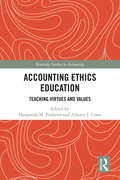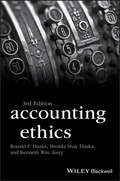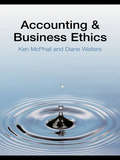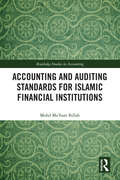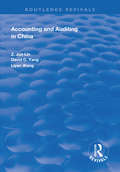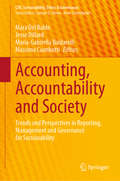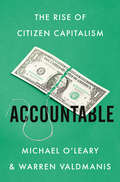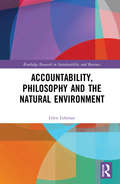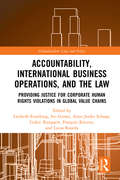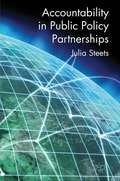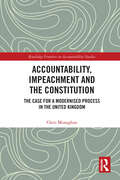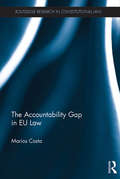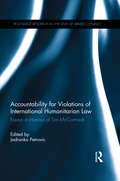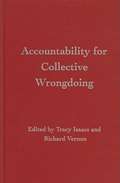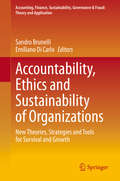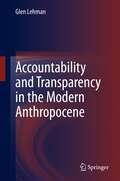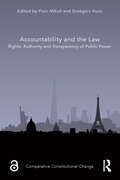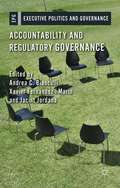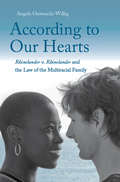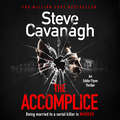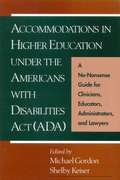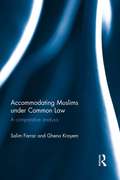- Table View
- List View
Accounting Ethics Education: Teaching Virtues and Values (Routledge Studies in Accounting)
by Margarida M. Pinheiro; Alberto J. CostaAccounting Ethics Education: Teaching Virtues and Values gathers a diversity of contributions from invited, well-known experts. It promotes a comprehensive reflection around how ethics can and should be taught to accounting students, discussing and highlighting the most updated research on accounting ethics education, and it is an essential reference in the field. The subject of accounting ethics education is critical to foster ethical awareness that may prevent the way in which one acts or behaves, especially towards others. The point is that accounting education cannot exist without ethical education and accountants must be technically proficient and ethically sensible since ethical behavior is vital to the status and credibility of the accountancy profession. And this sensibility must be developed while the future professional is still cultivating his or her moral and intellectual structure within the school learning environment: character and practical reasoning are crucial because they include not only knowledge of rules and principles, and their correct application but also values and virtues. Examining multiple perspectives, Accounting Ethics Education: Teaching Virtues and Values advances the scholarly debate by providing cuttingedge and insightful research vital for all those interested and immersed in these matters. It begins with a historical perspective of accounting ethics education and continues by exploring challenges, opportunities and developments in the area. It will be of great value to academics, students, researchers and professionals in the fields of accounting, accounting education and ethics.
Accounting Ethics (Foundations of Business Ethics #5)
by Brenda Shay Duska Ronald F. Duska Kenneth Wm. KuryAn accountant’s practice depends on making difficult decisions. To achieve the best results, individual accountants and accounting firms need a clear understanding of the ethical duties and decision-making involved in the four major functions of modern accounting—auditing, management accounting, tax accounting, and consulting—as well as a strong sense of ethical conduct to guide the certification and validation of reliable financial records. Now in its third edition, Accounting Ethics is a thorough and engaging exploration of the ethical issues that accountants encounter in their professional lives. Since the publication of the first edition in 2002, Accounting Ethics has become an indispensable resource for accounting courses and certification programs worldwide, known for its focus on real-world application, practical advice, reader-friendly guidance, and its insight into the effects of global change on the profession. Together with coverage of the contemporary regulatory environment—including the Sarbanes-Oxley Act, the Public Company Accounting Oversight Board, and the Dodd–Frank Wall Street Reform and Consumer Protection Act—this revised edition features expanded pedagogical resources such as new end-of-chapter case studies and discussion questions, and includes the updated AICPA Code of Conduct. Concise and dependable, Accounting Ethics sustains its reputation as an authoritative resource for practicing accountants, new professionals, students of accounting, and those who are considering the profession.
Accounting and Business Ethics: An Introduction
by Diane Walters Ken McPhailDespite the enormous impact of various accounting scandals on the accounting profession, the general malaise amongst the profession more broadly, and the significant legislative and institutional reforms that have taken place as a result, there are still surprisingly few textbooks on accounting ethics. This concise introductory text takes a broad view of ethics and accounting, taking into account contemporary social trends, such as globalization and terrorism. Rather than delineating codes of professional conduct, this text pushes the reader towards an understanding of the nature of ethical dilemmas and the factors that influence the ways in which accountants frame ethical questions. The book is divided into two parts. The first part focuses on developing thinking about the different kinds of ethical questions that could be posed in relation to accounting. The second part focuses more explicitly on accounting practice, exploring the ethical function of accounting in relation to the market economy, ethics in relation to the accounting profession, and the ethics of the international accounting harmonization project. Accounting and Business Ethics is a compact introduction aimed at both students and practitioners who want to understand more about the ethics of accounting.
Accounting and Auditing Standards for Islamic Financial Institutions (Routledge Studies in Accounting)
by Mohd Ma'Sum BillahWhile accounting and audit functions are significantly regulated and standardized in conventional financial industries and activities, through the implementation of International Accounting Standards, and International Financial Reporting Standards, as well as other international, regional, and local regulations, this is not the case for Islamic financial organizations. Rather than having their own set of comprehensive accounting or auditing standards or policies, these are based, in some cases, on the Accounting and Auditing Organization for Islamic Financial Institutions (AAIOFI), the Islamic Financial Services Board (IFSB)’s standards and Shari’ah based local policies. This book is a timely and comprehensive overview of accounting and auditing standards within the doctrine of Shari’ah. It offers a significant contribution to the field and a wealth of technical know-how. It analyzes Islamic accounting and auditing both in theory and practice and from a distinctly international perspective. The chapters are arranged in a systematic and logical way making it easily accessible and engaging. The book evaluates the existing standards and widens the scope of the discourse to include Maqasid al-Shari’ah, Islamic accounting and audit models and standards, as well as, offering practical policy recommendations. The author presents a Shari’ah justified solution to Islamic Accounting and Audit and offers guidance on overcoming the challenges to implementing Islamic Accounting and Auditing Standards. The book is a unique and exhaustive guide and, as such, will be an invaluable resource for academics, researchers, students, policymakers, as well as, practitioners in accounting and auditing firms and financial institutions.
Accounting and Auditing in China (Routledge Revivals)
by Z. Jun Lin David C. Yang Liyan WangFirst published in 1998, this book provides an updated introduction to accounting and auditing in China, incorporating the most recent developments up to June 1997. It covers all major aspects of Chinese accounting and auditing, including accounting administrative systems, qualifications and responsibility of Chinese accountants, accounting regulations or standards setting, cost and managerial accounting, financial reporting, statutory audit and public accounting, accounting for governments and non-profit organizations, business financing and taxation systems, EDP application in accounting, accounting education and research etc. Some of the main accounting and auditing legislation and standards are complied in the Appendix. The book will be an informative reference to readers, both business executives and professionals, outside of China. It can also be used as a textbook or teaching supplement for Universities and Colleges.
Accounting, Accountability and Society: Trends and Perspectives in Reporting, Management and Governance for Sustainability (CSR, Sustainability, Ethics & Governance)
by Maria-Gabriella Baldarelli Mara Del Baldo Jesse Dillard Massimo CiambottiThis book addresses the growing interest among policymakers, practitioners and academics in the evolution and the future implications of social, environmental and sustainability accounting. To do so, it examines the conceptual and practical application of accountability at multiple levels and contexts, and presents a range of case studies focusing on salient issues, perspectives and the potential of multidimensional accounting and reporting regimes. Intended for a diverse audience, the book allows readers to gain a better understanding of the topics, encourages dialogue and debate, and stimulates innovation in scholarship, policy and practice.
Accountable: The Rise of Citizen Capitalism
by Michael O'Leary Warren Valdmanis“More than ever before, this is the book our economy needs.” – Dr. Rajiv Shah, president of the Rockefeller Foundation“Unwilling to settle for easy answers or superficial changes, O’Leary and Valdmanis push us all to ask more of our economic system.” – Senator Michael F. BennetThis provocative book takes us inside the fight to save capitalism from itself.Corporations are broken, reflecting no purpose deeper than profit. But the tools we are relying on to fix them—corporate social responsibility, divestment, impact investing, and government control—risk making our problems worse.With lively storytelling and careful analysis, O’Leary and Valdmanis cut through the tired dogma of current economic thinking to reveal a hopeful truth: If we can make our corporations accountable to a deeper purpose, we can make capitalism both prosperous and good.What happens when the sustainability-driven CEO of Unilever takes on the efficiency-obsessed Warren Buffett? Does Kellogg’s—a company founded to serve a healthy breakfast—have a sacred duty to sell sugary cereal if that’s what maximizes profit? For decades, government has tried to curb CEO pay but failed. Why? Can Harvard students force the university to divest from oil and gas? Does it even matter if they do?O’Leary and Valdmanis, two iconoclastic investors, take us on a fast-paced insider’s journey that will change the way we look at corporations. Likely to spark controversy among cynics and dreamers alike, this book is essential reading for anyone with a stake in reforming capitalism—which means all of us.
Accountability, Philosophy and the Natural Environment (Routledge Research in Sustainability and Business)
by Glen LehmanUsing a philosophical and interdisciplinary approach, this book looks at how accountability can provide solutions to our current environmental and global political problems. When a social system has external elements imposed upon it, or presented to it, political problems are likely to emerge. This book demonstrates that what is needed are connecting social elements with a natural affinity to bring people together despite their differences. This book is different from others in the field. It provides new insights by critiquing the extant understandings of accountability and expands the possibilities by building on Charles Taylor’s philosophies. Central to the argument of the book are perspectives on authenticity and expressivism which are found to provide a radical reworking of our understanding of being in the world, and a starting point for rethinking the way individuals and communities ought to be dealing politically with accountability and ecological crises. The argument builds to an accountability perspective that utilises work from interpretivism, liberalism, and postmodern theory. The book will be of interest to researchers in environmental philosophy, critical perspectives on accounting, corporate governance, corporate social reporting, and environmental accounting.
Accountability, International Business Operations and the Law: Providing Justice for Corporate Human Rights Violations in Global Value Chains (Globalization: Law and Policy)
by Liesbeth Enneking Ivo Giesen Anne-Jetske Schaap Cedric Ryngaert François Kristen Lucas RoordaA consensus has emerged that corporations have societal and environmental responsibilities when operating transnationally. However, how exactly corporations can be held legally accountable for their transgressions, if at all, is less clear. This volume inquires how regulatory tools stemming from international law, public law, and private law may or may not be used for transnational corporate accountability purposes. Attention is devoted to applicable standards of liability, institutional and jurisdictional issues, and practical challenges, with a focus on ways to improve the existing legal status quo. In addition, there is consideration of the extent to which non-legal regulatory instruments may complement or provide more viable alternatives to these legal mechanisms. The book combines legaldoctrinal approaches with comparative, interdisciplinary, and policy insights with the dual aim of furthering the legal scholarly debate on these issues and enabling higher quality decision-making by policymakers seeking to implement regulatory measures that enhance corporate accountability in this context. Through its study of contemporary developments in legislation and case law, it provides a timely and important contribution to the scholarly and sociopolitical debate in the fastevolving field of international corporate social responsibility and accountability.
Accountability in Public Policy Partnerships
by Julia SteetsA PDF version of this book is available for free in open access via the OAPEN Library platform, www. oapen. org . This book presents a new model of accountability which ensures that public-private partnerships don't erode public accountability. It defines concrete accountability standards for different types of partnerships.
Accountability, Impeachment and the Constitution: The Case for a Modernised Process in the United Kingdom (Routledge Frontiers in Accountability Studies)
by Chris MonaghanThis book sets out and explores the case for a modernised impeachment process for the United Kingdom. The work examines the present law and history of impeachment in the United Kingdom, which today is widely regarded as having fallen into desuetude and its procedures inappropriate for modern conditions. It discusses how impeachment operates in two countries, the United States and Denmark, selected respectively for their marked differences from and similarities to the United Kingdom’s political and constitutional system, for the purposes of illumination and possible lessons for a new impeachment process. The book seeks to provide a balanced and independent examination of the case for this, concluding that it would have a valuable role to play in the future development of the United Kingdom’s system of politics and government. It concludes by setting out a detailed model for the structure, working and effect of impeachment. The book will be of interest to students, academics and policy-makers working in the areas of constitutional law and politics.
The Accountability Gap in EU law: Mind the Gap (Routledge Research in Constitutional Law)
by Marios CostaAlmost two decades ago, the fall of the Santer Commission against a background of allegations of maladministration and nepotism had the effect of placing accountability on the political agenda of the EU institutions. More recently, the non-ratification of the Constitutional Treaty, the difficulties of the ratification of the Lisbon Treaty and the current financial crisis have increased the calls for accountability in the EU. This book investigates whether any progress towards more accountability and transparency has been made in the post-Lisbon era by taking a holistic approach to the subject. Marios Costa argues that currently the EU institutions and the Member States are not in a position to hold the so-called independent agencies as well as the various committees and expert groups accountable. Despite recent progress, the EU still needs to put forward an acceptable constitutional framework which will truly secure accountability at the EU level of governance.
Accountability for Violations of International Humanitarian Law: Essays in Honour of Tim McCormack (Routledge Research in the Law of Armed Conflict)
by Jadranka PetrovicInternational criminal adjudication, together with the prosecution and appropriate punishment of offenders at a national level, remains the most effective means of enforcing International Humanitarian Law. This book considers the various issues emanating from present-day breaches of norms of International Humanitarian Law (IHL) and the question of how impunity for such breaches can be tackled. Honouring the work of Timothy McCormack, Professor of International Law at the University of Melbourne and a world renowned expert on IHL and International Criminal Law, contributors of the book explore the interplay between the rules governing accountability for violations of IHL and other areas of law that impact the prosecution of war crimes, including international criminal law, human rights law, arms control law, constitutional law and national criminal law. In providing a contemporary consideration of the various issues emerging from present-day breaches of norms of IHL, especially in light of growing interest in ‘fragmentation’ and ‘normative pluralism’, this book will be of great use and interest to students and researchers in public international law, international law, and conflict studies.
Accountability for Collective Wrongdoing
by Tracy Isaacs Richard VernonIdeas of collective responsibility challenge the doctrine of individual responsibility that is the dominant paradigm in law and liberal political theory. But little attention is given to the consequences of holding groups accountable for wrongdoing. Groups are not amenable to punishment in the way that individuals are. Can they be punished - and if so, how - or are other remedies available? The topic crosses the borders of law, philosophy, and political science, and in this volume specialists in all three areas contribute their perspectives. They examine the limits of individual criminal liability in addressing atrocity, the meanings of punishment and responsibility, the distribution of group punishment to a group's members, and the means by which collective accountability can be expressed. In doing so, they reflect on the legacy of the Nuremberg Trials, on the philosophical understanding of collective responsibility, and on the place of collective accountability in international political relations.
Accountability, Ethics and Sustainability of Organizations: New Theories, Strategies and Tools for Survival and Growth (Accounting, Finance, Sustainability, Governance & Fraud: Theory and Application)
by Sandro Brunelli Emiliano Di CarloThis book explains how the traditional paradigm of private and public organizations is changing as a result of the multiple factors that are affecting the way in which goods and services are produced, and for whom they are produced. In view of these disruptive trends, the theory of the firm needs to be updated and to some extent rethought. Moreover, diverse challenges and opportunities such as climate change, aging populations, and new public accountability requirements are necessitating novel frameworks to ensure the long-term survival of public and private organizations. Against this backdrop, the authors contribute to the debate over the firm’s primary interest by proposing a new way of viewing the nature of the firm and its relationship with stakeholders. In addition, they carefully analyze the challenges and opportunities mentioned above, evaluating their significance for various important aspects of organizations through different lenses. Global in scope, the book also takes the United Nations Sustainability Development Goals into account. Accordingly, it will be of interest to all readers seeking a better understanding of the evolving nature of firms and organizations in our changing world.
Accountability and Transparency in the Modern Anthropocene
by Glen LehmanThe book is about accountability processes and how they contribute solutions to our current environmental and global political problems. This book is different to other literature in this field. This is so because the dominant accountability discourse is shaped by what is defined as a neoliberal business case for social and environmental reform. This book assumes a nirvana stance within globalisation where all citizens operate within the parameters of the free market and will recover from adverse economic and political damage. Further this book uses neoliberalism and free-market reforms aims as examples to implement efficient management technologies and create more competitive pressures. Central to the argument of the book are perspectives on authenticity, expressivism and interpretivism which are found to provide a radical reworking of our understanding of being in the world. These frameworks offer a starting point for rethinking the way individuals, businesses and communities ought to be dealing politically with accountability and ecological crises. The argument builds to an accountability perspective that utilises work from expressivism, interpretivism, classical liberalism and postmodern theory. The theoretical quest undertaken in this book is to develop connections between accountability, democratic, ethical and ecological perspectives.
Accountability and the Law: Rights, Authority and Transparency of Public Power (ISSN)
by Piotr Mikuli Grzegorz KucaThis book discusses contemporary accountability and transparency mechanisms by presenting a selection of case studies.The authors deal with various problems connected to controlling public institutions and incumbents’ responsibility in state bodies. The work is divided into three parts. Part I: Law examines the institutional and objective approach. Part II: Fairness and Rights considers the subject approach, referring to a recipient of rights. Part III: Authority looks at the functional approach, referring to the executors of law. Providing insights into increasing understanding of various concepts, principles, and institutions characteristic of the modern state, the book makes a valuable contribution to the area of comparative constitutional change.It will be a valuable resource for academics, researchers, and policy-makers working in the areas of constitutional law and politics.
Accountability and the Law: Rights, Authority and Transparency of Public Power (Comparative Constitutional Change)
by Piotr Mikuli; Grzegorz KucaThis book discusses contemporary accountability and transparency mechanisms by presenting a selection of case studies. The authors deal with various problems connected to controlling public institutions and incumbents’ responsibility in state bodies. The work is divided into three parts. Part I: Law examines the institutional and objective approach. Part II: Fairness and Rights considers the subject approach, referring to a recipient of rights. Part III: Authority looks at the functional approach, referring to the executors of law. Providing insights into increasing understanding of various concepts, principles, and institutions characteristic of the modern state, the book makes a valuable contribution to the area of comparative constitutional change. It will be a valuable resource for academics, researchers, and policy-makers working in the areas of constitutional law and politics.
Accountability and Regulatory Governance
by Andrea C. Bianculli Xavier Fern�ndez-i-Mar�n Jacint JordanaThis collection improves our understanding of the problems associated to accountability in regulatory governance, focusing on audiences, controls and responsibilities in the politics of regulation and through a systematic exploration of the various mechanisms through which accountability in regulatory governance
According to Our Hearts
by Angela Onwuachi-WilligThis landmark book looks at what it means to be a multiracial couple in the United States today. According to Our Hearts begins with a look back at a 1925 case in which a two-month marriage ends with a man suing his wife for misrepresentation of her race, and shows how our society has yet to come to terms with interracial marriage. Angela Onwuachi-Willig examines the issue by drawing from a variety of sources, including her own experiences. She argues that housing law, family law, and employment law fail, in important ways, to protect multiracial couples. In a society in which marriage is used to give, withhold, and take away status--in the workplace and elsewhere--she says interracial couples are at a disadvantage, which is only exacerbated by current law.
The Accomplice: THE INSTANT SUNDAY TIMES TOP TEN BESTSELLER (Eddie Flynn Series)
by Steve CavanaghThe new Eddie Flynn novel from the Sunday Times and million copy bestselling author of THIRTEEN, FIFTY FIFTY and THE DEVIL'S ADVOCATE.'This guy is the real deal. Trust me.' LEE CHILD 'Top notch thrills and courtroom drama' SHARI LAPENA 'A terrific writer. He has talent to burn.' DON WINSLOW'Just when you thought there were no new twists to bring to the legal thriller, Cavanagh comes along and knocks your socks off. The high courts meet high concepts.' LINWOOD BARCLAY THE MOST HATED WOMAN IN AMERICAThe Sandman killings have been solved. Daniel Miller murdered fourteen people before he vanished. His wife, Carrie, now faces trial as his accomplice. The FBI, the District Attorney, the media and everyone in America believe she knew and helped cover up her husband's crimes.THE LAWYEREddie Flynn won't take a case unless his client is innocent. Now, he has to prove to a jury, and the entire world, that Carrie Miller was just another victim of the Sandman. She didn't know her husband's dark side and she had no part in the murders. But so far, Eddie and his team are the only ones who believe her.THE FORMER FBI AGENTGabriel Lake used to be a federal agent, before someone tried to kill him. Now, he's an investigator with a vendetta against the Sandman. He's the only one who can catch him, because he believes that everything the FBI knows about serial killers is wrong.THE KILLERWith his wife on trial, the Sandman is forced to come out of hiding to save her from a life sentence. He will kill to protect her and everyone involved in the case is a target.Even Eddie Flynn...
The Accomplice: The gripping, must-read thriller (Eddie Flynn Series)
by Steve CavanaghThe new Eddie Flynn novel from the Sunday Times and million copy bestselling author of THIRTEEN, FIFTY FIFTY and THE DEVIL'S ADVOCATE.'This guy is the real deal. Trust me.' LEE CHILD 'Top notch thrills and courtroom drama' SHARI LAPENA 'A terrific writer. He has talent to burn.' DON WINSLOWDaniel Miller murdered fourteen people before he vanished. His wife, Carrie, now faces trial as his accomplice. The FBI, the District Attorney, the media and everyone in America believe she knew and helped cover up her husband's crimes.Eddie Flynn won't take a case unless his client is innocent. Now, he has to prove to a jury, and the entire world, that Carrie Miller didn't know her husband's dark side. But so far, Eddie and his team are the only ones who believe that she had no part in the murders.With his wife on trial, Daniel Miller is forced to come out of hiding to save her from a life sentence. He will kill to protect her and everyone involved in the case is a target.Even Eddie Flynn...
The Accomplice: The gripping, must-read thriller (Eddie Flynn Series)
by Steve CavanaghThe new Eddie Flynn novel from the Sunday Times and million copy bestselling author of THIRTEEN, FIFTY FIFTY and THE DEVIL'S ADVOCATE.'This guy is the real deal. Trust me.' LEE CHILD 'Top notch thrills and courtroom drama' SHARI LAPENA 'A terrific writer. He has talent to burn.' DON WINSLOWDaniel Miller murdered fourteen people before he vanished. His wife, Carrie, now faces trial as his accomplice. The FBI, the District Attorney, the media and everyone in America believe she knew and helped cover up her husband's crimes.Eddie Flynn won't take a case unless his client is innocent. Now, he has to prove to a jury, and the entire world, that Carrie Miller didn't know her husband's dark side. But so far, Eddie and his team are the only ones who believe that she had no part in the murders.With his wife on trial, Daniel Miller is forced to come out of hiding to save her from a life sentence. He will kill to protect her and everyone involved in the case is a target.Even Eddie Flynn...
Accommodations in Higher Education under the Americans with Disabilities Act: A No-Nonsense Guide for Clinicians, Educators, Administrators, and Lawyers
by Michael Gordon Shelby Keiser Alta LapointThis manual outlines how the ADA applies to a wide range of mental and physical impairments within higher education settings, it outlines a series of fundamental principles and actual clinical/administrative procedure
Accommodating Muslims under Common Law: A Comparative Analysis
by Salim Farrar Ghena KrayemThe book explores the relationship between Muslims, the Common Law and Sharīʽah post-9/11. The book looks at the accommodation of Sharīʽah Law within Western Common Law legal traditions and the role of the judiciary, in particular, in drawing boundaries for secular democratic states with Muslim populations who want resolutions to conflicts that also comply with the dictates of their faith. Salim Farrar and Ghena Krayem consider the question of recognition of Sharīʽah by looking at how the flexibilities that exists in both the Common Law and Sharīʽah provide unexplored avenues for navigation and accommodation. The issue is explored in a comparative context across several jurisdictions and case law is examined in the contexts of family law, business and crime from selected jurisdictions with significant Muslim minority populations including: Australia, Canada, England and Wales, and the United States. The book examines how Muslims and the broader community have framed their claims for recognition against a backdrop of terrorism fears, and how Common Law judiciaries have responded within their constitutional and statutory confines and also within the contemporary contexts of demands for equality, neutrality and universal human rights. Acknowledging the inherent pragmatism, flexibility and values of the Common Law, the authors argue that the controversial issue of accommodation of Sharīʽah is not necessarily one that requires the establishment of a separate and parallel legal system.
